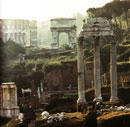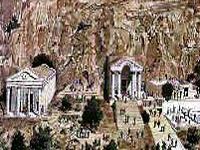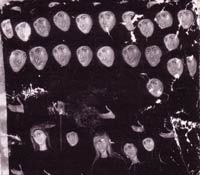| A revised version of this article, updated and annotated with sources, should be online shortly. |
Caius Galerius, a shepherd who became a soldier, rose through the ranks of the army to become the penultimate pagan emperor of Rome. Appointed caesar by Diocletian in March 293, Galerius became augustus following his patron's abdication in May 305. Two years earlier Galerius had urged upon Diocletian a persecution of the Orthodox Church, the so-called "Great persecution". This ineffectual policy Galerius himself abandoned, issuing in his own name and that of his co-emperors Licinius and Constantine an Edict of Toleration, shortly before his death in May 311. The legalisation of the Church was reaffirmed by Constantine in the more celebrated Edict of Milan of 313. For the now legalized Church it was the beginning of payback time.
"We have been especially anxious that even the Christians, who have abandoned the religion of their ancestors, should return to reason ... In view of our most mild clemency and the constant habit by which we are accustomed to grant indulgence to all, we thought that we ought to grant our most prompt indulgence also to these, so that they may again be Christians and may hold their conventicles, provided they do nothing contrary to good order ... Wherefore, for this our indulgence, they ought to pray to their God for our safety, for that of the republic, and for their own, that the republic may continue uninjured on every side, and that they may be able to live securely in their homes."
– Galerius' Edict of Toleration 311 (Source: Medieval Sourcebook)
Three centuries of persecution of the pagans
"Of all
the tyrannies that afflict mankind, tyranny in religion is the worst. Every
other species of tyranny is limited to the world we live in, but
this attempts a stride beyond the grave and seeks to pursue us
into eternity."
- Thomas Paine
314 Immediately after its full legalisation, the Christian
Church attacks non-Christians. The Council of Ancyra denounces
the worship of goddess Artemis.
324 In Didyma, Minor
Asia, The emperor Constantine sacks the Oracle of the god Apollo and tortures the
pagan priests to death. He also evicts all non-Christian peoples
from Mount Athos and destroys all the local Hellenic temples.
325 Council of Nicea.
The godman gets a promotion: 'Christ is Divine'.
326 Constantine, following the instructions of
his mother Helen, destroys the temple of the god Asclepius
in Aigeai, Cilicia and many temples of the goddess Aphrodite
in Jerusalem, Aphaca, Mambre, Phoenicia, Baalbek, etc.
330 Constantine steals the treasures and statues
of the pagan temples of Greece to decorate Constantinople, the
new capital of his Empire.
335 Constantine sacks many pagan temples in
Asia Minor and Palestine and orders the execution by crucifixion
of
“all magicians and soothsayers.” Martyrdom of the
neoplatonist philosopher Sopatrus.
A 'Father'
of the Dark Age
Ambrose
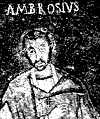
City
boss of Milan,
Imperial Bishop
(340-397)
|
Legacy:
– Church coercion over weak, superstitious emperors and elevation of the church hierarchy:
"Nothing
can be found in this world more exalted than
priests or more sublime than bishops." – Ambrose
– Invention
of 'saints'.
– Christ as a warrior:
"Christ
... stands at the head of the legions." – Ambrose
– Propagator
of the dogma
of the 'Trinity' (anti-Arian
nonsense).
– Hierarchical, disciplined and monastic regimentation of the clergy.
– Subordination of women.
– Anti-sex:
"What
is virginal chastity but an integrity free
of stain from outside?" – Ambrose
– Anti-semitism.
|
|
341 Constantius II (Flavius Julius Constantius) persecutes “all
the soothsayers and the Hellenists.” Many gentile Hellenes
are either imprisoned or executed.
346 New large scale persecutions against non-Christian
peoples in Constantinople. Banishment of the famous orator Libanius
accused as a “magician”.
353 An edict of Constantius orders the death penalty
for all kind of worship through sacrifice and “idols”.
354 A new edict orders the closing of all the pagan
temples. Some of them are profaned and turned into brothels
or gambling rooms.
Execution
of pagan priests begins. A new edict of Constantius orders the destruction
of the pagan temples and the execution of all “idolaters”.
First burning of libraries in various cities of the empire.
The first
lime factories are organised next to the closed pagan
temples. A major part of the holy architecture of the
pagans is turned into lime.
357 Constantius outlaws all methods of divination
(astrology not excluded).
359 In Skythopolis, Syria, the Christians organise
the first death camps for the torture and executions of the
arrested non-Christians from all around the empire.
361 to 363 Religious tolerance and restoration
of the pagan cults is declared in Constantinople (11th December
361) by the pagan emperor Julian (Flavius Claudius Julianus).
"It is, I think, expedient to set forth to all mankind the reasons by which I was convinced that
the fabrication of the Galilaeans is a fiction of men composed by wickedness. Though it has in it nothing divine, by making full use of that part of the soul which loves fable and is childish and foolish, it has induced men to believe that the monstrous tale is truth."
–
Julian, Against the Galileans: remains of the 3 books, excerpted from Cyril of Alexandria, Contra Julianum (1923) pp.319-433.
3 point masterplan for a pagan counter-reformation is put forth: 1) the announcement that pagan temples must be reopened or built; 2) the edict of universal religious tolerance -- especially important since Julian emphasized that no persecution would be tolerated -- he did not want to create martyrs; and, 3) the edict that banned Christians from teaching the classics -- this included a ban on teaching the 3 pillars of Roman education, namely: grammar, rhetoric, and philosophy.
362 Education Edict banning Christians from teaching grammar, rhetoric, and philosophy.
363 Assassination
of Julian (26th June).
364 Emperor Jovian orders the burning of the Library
of Antioch.
An Imperial
edict (11th September) orders the death penalty for all those
that worship their ancestral gods or practice divination (“sileat
omnibus perpetuo divinandi curiositas”).
Three different
edicts (4th February, 9th September, 23rd December) order the confiscation
of all properties of the pagan temples and the death penalty for
participation in pagan rituals, even private ones. The
Church Council of Laodicea (Phrygia
– western Asia Minor) orders that religious observances are to
be conducted on Sunday and
not on Saturday. Sunday becomes
the new Sabbath. The practice of staying at home and resting
on Saturday declared sinful and anathema to Christ.
365 An imperial edict from Emperor Valens, a zealous
Arian Christian (17th November), forbids
pagan officers of the army to command Christian soldiers.
370 Valens orders a tremendous persecution of non-Christian
peoples in all the Eastern Empire. In Antioch, among many other
non-Christians, the ex-governor Fidustius and the priests Hilarius
and Patricius are executed. The philosopher Simonides is burned
alive and the philosopher Maximus is decapitated. All
the friends of Julian are persecuted (Orebasius, Sallustius, Pegasius
etc.).
Tons of books are burnt in the squares
of the cities of the Eastern Empire.
| Book Burning Begins – in the Bible! |
| |
"A number of those
who practiced magical arts brought their books together and burned them
in sight of all. And they calculated together the prices of them and found
them worth fifty thousand pieces of silver."
– Acts 19.19
A priceless library is destroyed
and the Bible celebrates – "thus the word of Jehovah kept
growing and prevailing."
|
|
372 Valens orders the governor of Minor Asia to exterminate
all the Hellenes and all documents of their wisdom.
373 New prohibition of all divination methods is
issued.
The term “pagan” (pagani, villagers, equivalent to the
modern insult, “peasants”) is introduced by the Christians
to demean non-believers.
375 The temple of Asclepius in Epidaurus, Greece,
is closed down by the Christians.
380 The notorious Edict of Thessalonika.
On 27th February Christianity becomes the exclusive
religion of the Roman Empire by an edict of the Emperor Flavius Theodosius, requiring that:
"All the various nations which are subject to our clemency
and moderation should continue in the profession of that religion
which was delivered to the Romans by the divine Apostle Peter."
Non-Christians are called “loathsome, heretics, stupid
and blind”. |
In another edict,
Theodosius calls “insane” those that do not believe
to the Christian God and outlaws all disagreement with the Church
dogmas.
Ambrosius,
bishop of Milan, begins the destruction of pagan temples
of his
area. The Christian priests lead the hungry mob against the
temple of goddess Demeter in Eleusis and try to lynch the
hierophants Nestorius and Priskus. The 95 year old hierophant Nestorius
ends the Eleusinian Mysteries and announces "the predominance
of
mental darkness over the human race."
381 Theodosius convenes the Council of Constantinople. The 'Holy Spirit'
is declared 'Divine', thus sanctioning a triune god.
On 2nd May, Theodosius deprives
of all their rights any Christians who return to the
pagan religion. Throughout the Eastern Empire pagan temples
and libraries are looted or burned down. On 21st December,
Theodosius outlaws
visits to Hellenic temples.
In Constantinople,
the Temple of Aphrodite is turned into a brothel and the
temples of the Sun and Artemis to stables.
382 “Hellelujah” (“Glory to Yahweh”)
is imposed in the Christian mass.
384 Theodosius orders the Praetorian Prefect Maternus
Cynegius, a dedicated Christian, to cooperate with local bishops
and destroy the temples of the pagans in Northern Greece and
Minor Asia.
A 'Father'
of the Dark Age
John
Chrysostom
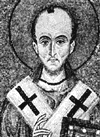
Holy
Hierarch of Constantinople
(347-407) |
Legacy:
– Demagogic oratory.
– Mobs of Gothic 'catechumen' and armed monks, used to destroy pagan shrines.
– Anti-intellectualism:
"Empty
your minds of secular knowledge." – Chrysostom
– 'Plain'
(literal) interpretation of scripture.
– Anti-sex, prudish, kill-joy morality:
"There
ought to be a wall inside this church to keep
you apart ... The women have learned the manners
of the brothel, and the men are no better than
maddened stallions."
– Chrysostom (Lane, Pagans & Christians, p374)
– Morbid solemnity in liturgy. Christian songs replace bawdy
folk ballads. Holidays
which had integrated the seasons into people's lives
replaced with solemn commemorations of 'biblical
events.'
– Anti-semitism:
'The
pitiful and miserable Jews ... Certainly it
is the time for me to show that demons dwell
in the synagogue, not only in the place
itself but also in the souls of the Jews ...
And this is what happened to the Jews: while
they
were making themselves unfit for work, they
grew fit for slaughter.
– Chrysostom (Against the Jews, Homily I)
– Defence
of slavery. Slavery
extended and made harsher, autocracy endorsed, new
forms of tyranny.
"The
slave should be resigned to his lot ... in
obeying his master he is obeying God."
Mark
of the Slave
The "tonsure" or
shaven head was a practice enforced by imperial
Rome on slaves, a form of branding. Long hair was
the mark of a freeman. The practice was taken up
by early monks (self-styled 'slaves of Christ'),
spread to priests and subsequently made obligatory
by the Church on all clerics.
The clergy – along with everybody else – were now slaves of Holy
Mother Church.
|
|
385 to 388 Prefect Maternus Cynegius, encouraged by
his fanatic wife, and bishop 'Saint' Marcellus with his gangs, scour
the countryside and sack and destroy hundreds of Hellenic temples,
shrines and altars. Among others they destroy the temple of
Edessa, the Cabeireion of Imbros, the temple of Zeus in Apamea,
the temple of Apollo in Didyma and all the temples of Palmyra.
Thousands
of innocent pagans from all sides of the empire suffer martyrdom
in the notorious death camps of Skythopolis.
386 Theodosius outlaws the care of the sacked pagan
temples.
388 Public talks on religious subjects are outlawed
by Theodosius. The old orator Libanius sends his famous epistle
“Pro Templis” to Theodosius with the hope that the few
remaining Hellenic temples will be respected and spared.
389 to 390 All non-Christian calendars and dating-methods
are outlawed. Hordes of fanatic hermits from the desert flood
the cities of the Middle East and Egypt and destroy statues,
altars,
libraries and pagan temples, and lynch the pagans. Theophilus,
Patriarch of Alexandria, starts heavy persecutions against
non-Christian peoples, turning the temple of Dionysius into a
Christian church,
burning
down the Mithraeum of the city, destroying the temple of Zeus and
burlesques the pagan priests before they are killed by stoning. The Christian mob profanes the cult images.
391 On 24th February, a new edict of Theodosius prohibits
not only visits to pagan temples but also looking at the vandalised
statues. New heavy persecutions occur all around the empire.
In Alexandria, Egypt, pagans, led by the philosopher Olympius,
revolt
and after
some street fights they lock themselves inside the fortified temple
of the god Serapis (the Serapeion). After a violent siege,
the Christians take over the building, demolish it, burn its famous
library and
profane the cult images.
392 On 8th November, Theodosius outlaws all the
non-Christian rituals and names them “superstitions of the
gentiles”
(gentilicia superstitio). New full scale persecutions
are ordered against pagans.
The Mysteries of Samothrace are ended and the priests slaughtered. In Cyprus the local bishop “Saint” Epiphanius and “Saint”
Tychon destroy almost all the temples of the island and exterminate
thousands of non-Christians. The local Mysteries of goddess Aphrodite
are ended.
Theodosius’s edict declares:
“The
ones that won’t obey pater Epiphanius have no right
to keep living in that island.”
The
pagans revolt against the Emperor and the Church in Petra, Aeropolis,
Rafia, Gaza, Baalbek and other
cities
of the Middle East.
393 The Pythian Games, the Aktia Games and the Olympic
Games are outlawed as part of the Hellenic “idolatry”.
The Christians sack the temples of Olympia.
395 Two new edicts (22nd July and 7th August) cause
new persecutions against pagans. Rufinus, the eunuch Prime Minister
of Emperor Flavius Arcadius directs the hordes
of baptised Goths (led by Alaric) to the country of the Hellenes. Encouraged
by Christian monks the barbarians sack and burn many cities (Dion,
Delphi, Megara, Corinth, Pheneos, Argos, Nemea, Lycosoura, Sparta,
Messene, Phigaleia, Olympia, etc.), slaughter or enslave innumerable
gentile Hellenes and burn down all the temples. Among others,
they burn down the Eleusinian Sanctuary and burn alive all its priests
(including the hierophant of Mithras Hilarius).
396 On 7th December, a new edict by Arcadius orders
that paganism be treated as high treason. Imprisonment of
the few remaining pagan priests and hierophants.
397 “Demolish them!” Flavius Arcadius
orders that
all the still standing pagan temples be demolished.
A 'Father'
of the Dark Age
Augustine
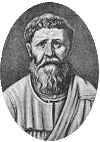
Theorist
of Hippo
('Father of the Inquisition')
(354-430)
|
Denied Christians had forged the prophecies about Christ:
"The Jews who slew Him, and would not believe in Him, because it behoved Him to die and rise again, were yet more miserably wasted by the Romans, and utterly rooted out from their kingdom, where aliens had already ruled over them, and were dispersed through the lands (so that indeed there is no place where they are not), and are thus by their own Scriptures a testimony to us that we have not forged the prophecies about Christ." – Augustine, The City of God, 18.46.
Legacy:
– 'Just War'. So much for "love your enemies".
– Doctrine of 'original sin' (obsession with the sin of lust).
"Augustine's primary spiritual task was to remove the stain
of sexual desire. He
thus became the great theologian of guilt and sin
but, as is often the case, he
remained blind to the price that others had to
pay for his righteousness." – Bishop
J. S. Spong (Born of a Woman, p216)
– Persecution of pagans. Murder of scientists, destruction of libraries.
– Intolerance of heretics (proscribed Donatists, Pelagians):
"The
Emperor has a duty to suppress schism and heresy."
– Forced
conversion ('stout
blow'). Uses Luke 14.23:
"And
the master said to the slave, 'Go out into the
roads and the fenced-in places, and compel
them to come in, that my house may be filled."
– Weakened
Roman self-confidence with notion of 'predestination' and
superiority of 'City of God':
"Since
God knows everything, everything is predetermined by him forever."
"Freedom
is freedom to err." – St
Augustine
– Sprinkling
of infants introduced.
– Purgatory: "It
is a key assumption of the purgatorial view
that suffering makes people whole ...
a stage along the path to perfection." - Evangelical Alliance (The Nature of Hell, p22)
– Crushing
of intellectualism. All learning is subordinated
to scripture:
“Scripture
gives no false information.”
"Since God has spoken to us it is no longer necessary for us to think." – St
Augustine
|
|
398 The 4th Church Council of Carthage prohibits
everybody, including Christian bishops, from studying pagan
books. Porphyrius, bishop of Gaza, demolishes
almost all the pagan temples of his city (except nine of them
that
remain active).
399 With a new edict (13th July) Flavius Arcadius orders
all remaining pagan temples, mainly in the countryside,
be immediately demolished.
400 Bishop Nicetas destroys the Oracle of Dionysus
in Vesai and baptises all the non-Christians of this area.
401 The Christian mob of Carthage lynches non-Christians
and destroys temples and “idols”. In Gaza too, the local
bishop “Saint” Porphyrius sends his followers to lynch
pagans and to demolish the remaining nine still active temples
of the
city.
The 15th Council of Chalcedon orders all the Christians
that still keep good relations with their non-Christian relatives
to be excommunicated (even after their death).
405 John Chrysostom sends hordes of
grey-dressed monks armed with clubs and iron bars to destroy the “idols”
in all the cities of Palestine.
406 John Chrysostom collects funds from rich Christian
women to financially support the demolition of the Hellenic temples.
In Ephesus he orders the destruction of the famous temple of Artemis. In Salamis, Cyprus, “Saints” Epiphanius and Eutychius
continue the persecutions of the pagans and the total destruction
of their temples and sanctuaries.
407 A new edict outlaws once more all the non-Christian
acts of worship.
408 The emperor of the Western Empire, Honorius, and
the emperor of the Eastern Empire, Arcadius, order all
the sculptures of the pagan temples to be either destroyed or
to be taken away. Private ownership of pagan sculpture is
also outlawed. The local bishops lead new heavy persecutions
against the pagans and new book burning. The judges that have
pity for the pagans are also persecuted. “Saint” Augustine
massacres hundreds of protesting pagans in Calama, Algeria.
409 Another edict orders all methods of divination
including astrology to be punished by death.
415 In Alexandria, the Christian mob, urged by the
bishop Cyril, attacks a few days before the Judeo-Christian Pascha (Easter) and cuts to pieces the famous and beautiful philosopher
Hypatia. The pieces of her body, carried around by the Christian
mob through the streets of Alexandria, are finally burned together
with her books in a place called Cynaron.
On 30th August,
new persecutions start against all the pagan priests of North
Africa who end their lives either crucified or burned alive.
Emperor Theodosius II expels the Jews from Alexandria.
416 The inquisitor Hypatius, alias “The Sword of
God”, exterminates the last pagans of Bithynia. In Constantinople
(7th December) all non-Christian army officers, public employees
and judges are dismissed.
423 Emperor Theodosius II declares (8th June) that
the religion of the pagans is nothing more than “demon worship”
and orders all those who persist in practicing it to be punished
by imprisonment and torture.
429 The temple of goddess Athena (Parthenon) on the
Acropolis of Athens is sacked. The Athenian pagans are persecuted.
431 Council
of Ephesus ("Robber Synod"). Promotion for the godman
– "Christ is complete God and complete man." Decree sentenced Porphyry's books to be burned.
435 On 14th November, a new edict by Theodosius II
orders the death penalty for all “heretics” and pagans
of the empire. Only Judaism is considered a legal non-Christian
religion.
438 Theodosius II issues an new edict (31st January)
against the pagans, incriminating their “idolatry”
as the reason of a recent plague!
440 to 450 The Christians demolish all the monuments,
altars and temples of Athens, Olympia, and other Greek cities.
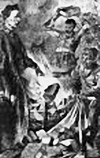 |
448 Theodosius II
orders all non-Christian books to be burned (Porphyry was condemned though Julian ignored).
450 All
the temples of Aphrodisias (the City of the Goddess Aphrodite)
are demolished and all its libraries burned down. The
city is renamed Stavroupolis (City of the Cross).
451 Council
of Chalcedon.
New edict by Theodosius II (4th November) emphasises that “idolatry” is punished by death. Assertion of orthodox doctrine over the 'Monophysites'
– 'JC has single, divine nature.'
|
457 to 491 Sporadic persecutions against the pagans
of the Eastern Empire. Among others, the physician Jacobus and
the philosopher Gessius are executed. Severianus, Herestios,
Zosimus, Isidorus and others are tortured and imprisoned. The
proselytiser Conon and his followers exterminate the last non-Christians
of Imbros Island, Northeast Aegean Sea. The last worshippers
of Lavranius Zeus are exterminated in Cyprus.
482 to 488 The majority of the pagans of Minor Asia
are exterminated after a desperate revolt against the emperor
and the Church.
486 More “underground” pagan priests are discovered,
arrested, burlesqued, tortured and executed in Alexandria, Egypt.
 |
515 Baptism
becomes obligatory even for those that already say they
are Christians.
The emperor of Constantinople, Anastasius, orders the massacre
of the pagans in the Arabian city Zoara and the demolition
of the temple of local god Theandrites.
|
523 Emperor
Justin I outlaws the Arian heresy and campaigns to suppress
Arianism everywhere.
528 Emperor Justinian outlaws the “alternative” Olympian
Games of Antioch. He also orders the execution—by fire,
crucifixion, tearing to pieces by wild beasts or cutting to pieces
by iron nails—of all who practice “sorcery, divination,
magic or idolatry” and prohibits all teachings by the pagans (“the ones suffering from the blasphemous insanity of the
Hellenes”).
529 Justinian outlaws the Athenian Philosophical
Academy and has its property confiscated. Decree that anti-Christian books were to be burned, Porphyry alone was named, though probably Julian was meant to be included.
532 The inquisitor Ioannis Asiacus, a fanatical
monk, leads a crusade against the pagans of Minor Asia.
542 Justinian allows the inquisitor Ioannis Asiacus
to forcibly convert the pagans of Phrygia, Caria and Lydia in Asia
Minor. Within 35 years of this crusade, 99 churches and 12
monasteries are built on the sites of demolished pagan temples.
A 'Father'
of the Dark Age
Pope
Gregory
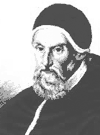
'God's
Consul' in Rome
(540-604)
|
Legacy:
– Concentrated power in the hierarchs of the Church. Papal Supremacy was supported
by
secular
authority
given
to
the
clergy,
who supplanted
the
imperial civil service.
– Clergy given regalia and 'privilegia'.
– Accumulation of vast papal wealth and landed estates.
– Secularisation of the Church. Wealthy noblemen chose the pope, usually
from
among
themselves. Popes
with no training as priest.
– Illegitimate papal children appointed cardinals
– Fantastic,
miracle-filled 'Lives
of
Saints', many of whom never existed! Gregory had
no mind for theology but he saw that great wealth was to be made from the veneration and sale of 'relics' to gullible pilgrims. Thousands of believers
were deceived and purchased expensive relics.
– Hostility to secular learning. Grammar
banned, Library
burned. Gregory ordered bishops to
desist from the "wicked labour" of teaching grammar
and Latin to lay people. He forbade lay people
from reading the Bible and ordered the burning of the Palatine Apollo
library so that its secular literature "would not distract" from
religious devotion.
With education
reduced to theology and even that forbidden to all
but the clergy, the result was a society sunk in
illiteracy for almost 1000 years.
– Purgatory embellished, providing a foundation for the sale of indulgences.:
"Unbaptised
babies go straight to Hell and suffer there
for all eternity."
– Demonology.
– Forced conversion of 'pagans' and sequestering of their shrines.
Statues
destroyed .
Gregory ordered many ancient
Roman statues, marbles and mosaics destroyed or turned into lime. Remnants
were used to adorn Christian churches and cathedrals.
– Rome's
'missionaries' take over from local clerics, enforce Roman sacraments.
– 'Plain song' (chanting) introduced, even as a cure for plague.
– Unloving view of sex, Enforced
celibacy.
"All
sexual desire is sinful in itself and
is justified only for the sake of children." – Gregory
I.
"Woman is a temple
built upon a sewer."
– Anicius Boethius, The Consolation of Philosophy.Christian
philosopher (480-524) tells it as it is!
Gregory – an unmarried bisexual – introduced a celibacy
edict to prevent property from passing from the Church to wives, families
or mistresses of the clergy. Thousands of babies were drowned in a pond
outside the Lateran palace after the edict was issued.
|
|
546 Hundreds of pagans are put to death in Constantinople
by the inquisitor Ioannis Asiacus.
556 Justinian orders the notorious inquisitor Amantius
to go to Antioch, to find, arrest, torture and exterminate the
last non-Christians of the city and burn all the private
libraries down.
562 Mass arrests, burlesquing, tortures, imprisonments
and executions of gentile Hellenes in Athens, Antioch, Palmyra and
Constantinople.
578 to 582 The Christians torture and crucify
Hellenes all around the Eastern Empire, and exterminate the last
non-Christians of Heliopolis (Baalbek).
580 The Christian inquisitors attack a secret temple of Zeus
in Antioch. The priest commits suicide, but the rest of the pagans
are arrested. All the prisoners, the Vice Governor Anatolius included,
are tortured and sent to Constantinople to face trial. Sentenced
to death they are thrown to the lions. The wild animals being
unwilling to tear them to pieces, they end up crucified.
Their dead bodies are dragged in the streets by the Christian mob
and afterwards thrown unburied in the dump.
583 New persecutions against the gentile Hellenes by
Emperor Maurice.
590 In all the Eastern Empire the Christian accusers
“discover” pagan conspiracies. New storm of torture and
executions.
Inspired by: Vlasis Rassias, Demolish Them! … Published
in Greek, Athens 1994
Sources:
Charles
Freeman, The Closing of the Western Mind (Heinemann, 2002)
Henry Hart Milman, The
History of the Jews (Everyman, 1939)
John Julius Norwich, Byzantium (Viking, 1988)
Fridrich Heer (ed) The Fires of Faith (Newsweek 1970)
Dan Cohn-Sherbok, The Crucified Jew (Harper Collins,1992)
Leslie Houlden (Ed.), Judaism & Christianity (Routledge, 1988)
Norman Cantor, The Sacred Chain - A History of the Jews (Harper
Collins, 1994)
Hugh Trevor Roper, The Rise of Christianity (Thames & Hudson,
1965)
Frank Delaney, A Walk in the Dark Ages (Collins, 1988)
David Chidester, Christianity- A Global history (Allen Lane, 2000)
Robin Lane Fox, Pagans & Christians (Viking,1986)
John Moorhead, Ambrose (Longman, 1999)
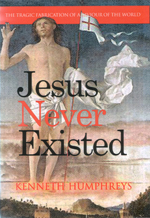
|
 |

|

|
Some fifty articles are now available as a book.
For your copy order:

|
|
Copyright © 2004
by Kenneth Humphreys.
Copying is freely permitted, provided credit is given to the author and no
material herein is sold for profit.
|

